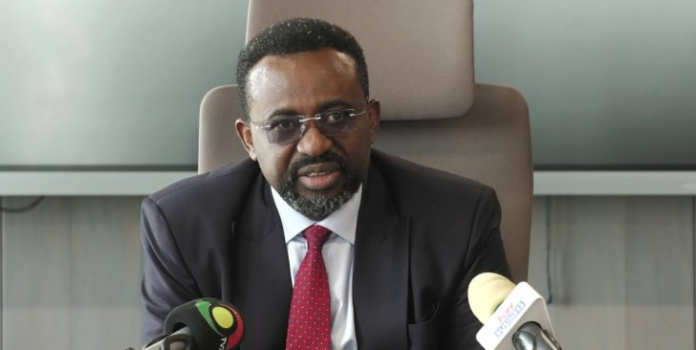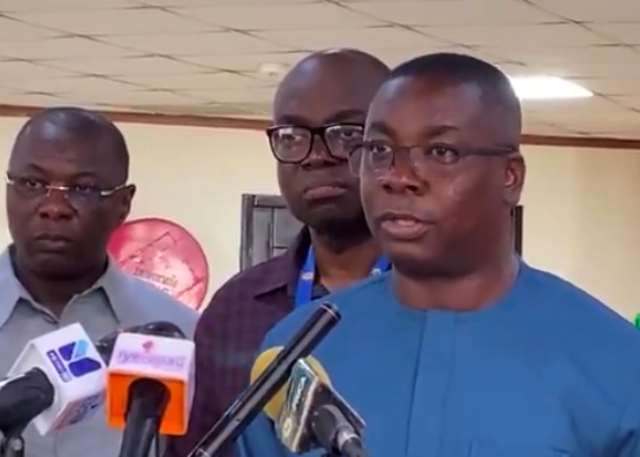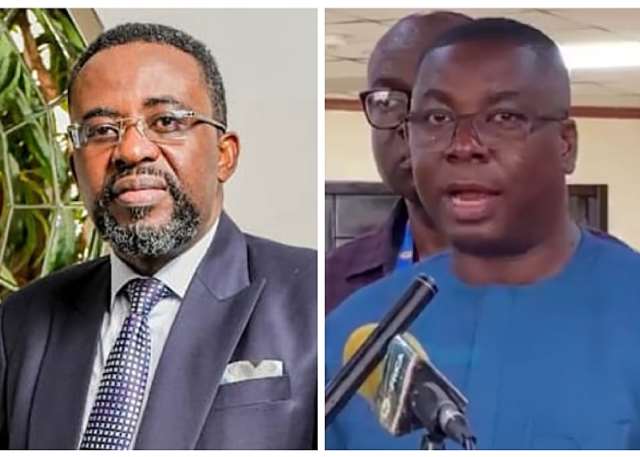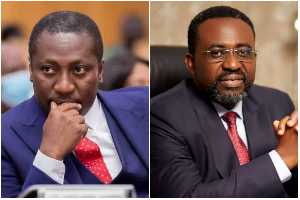Minority in Parliament Condemns President Mahama Over Discontinuation of Criminal Charges Against Acting BoG Governor

The Minority in Parliament has launched a scathing critique of President John Dramani Mahama for facilitating the discontinuation of criminal charges against Dr. Johnson Asiamah, the Acting Governor of the Bank of Ghana (BoG). The opposition lawmakers argue that this move undermines the principles of transparency and accountability and raises serious concerns about governance, the independence of state institutions, and the integrity of Ghana’s financial sector.
At a press conference on Wednesday, 5th February, the Minority, led by the Member of Parliament for Tano North, Dr. Gideon Boako, strongly opposed the Attorney General’s decision to drop all charges against Dr. Asiamah. They insisted that his ongoing prosecution should not have been halted simply because of his new appointment as Acting Governor. The Minority described the move as politically motivated and a dangerous precedent that could weaken public confidence in the rule of law.

Background of the Case
Dr. Asiamah, who previously served as Deputy Governor of the Bank of Ghana under the former administration, was facing criminal charges related to financial mismanagement. Specifically, he was accused of authorizing substantial financial support to a commercial bank that had been declared insolvent due to severe irregularities and mismanagement by its leadership. The decision to inject funds into the struggling institution was taken despite warnings from financial regulators that the bank’s operations had become unsustainable.
Under the previous government, an investigation was launched into the matter, leading to the prosecution of key figures involved, including Dr. Asiamah. However, following a change in administration, the Attorney General under President Mahama’s government reviewed the case and decided to discontinue the charges. The Attorney General defended the move, claiming that the charges were politically motivated and part of a broader witch-hunt by the former regime against officials associated with the financial sector. This was followed by Dr. Asiamah’s elevation to Acting Governor of the BoG, a decision that has sparked controversy and drawn widespread criticism from the opposition.

Minority’s Concerns Over Governance and Accountability
The Minority contends that the discontinuation of the case is a blatant interference with the judicial process and raises serious governance concerns. They argue that allowing politically appointed officials to evade prosecution based on partisan considerations undermines the credibility of Ghana’s legal and financial institutions.
According to the opposition lawmakers, the move demonstrates a worrying trend where political connections, rather than legal merit, determine the outcome of corruption and financial misconduct cases. They warned that such actions could set a dangerous precedent where government officials accused of financial mismanagement or abuse of power are shielded from prosecution once they gain favor with the ruling party.
“The decision to drop these charges does not exonerate Dr. Asiamah in any way,” Dr. Boako stated during the press conference. “It only raises further questions about whether the government is committed to fighting corruption and ensuring that public officials are held accountable for their actions. The people of Ghana deserve transparency and justice, not politically motivated legal maneuvering.”


The Minority further expressed concern that this move could embolden future financial misconduct, as officials might assume they can evade justice if they align themselves with the right political forces. They stressed that the case should have been allowed to run its full course in court to determine Dr. Asiamah’s culpability or innocence, rather than being unilaterally dismissed by the government.
Economic and Political Implications for Ghana
Beyond governance concerns, the Minority warned that the decision to discontinue the prosecution could have far-reaching economic and political consequences for Ghana. They highlighted the potential impact on investor confidence, stating that international financial institutions and economic risk analysts closely monitor developments in governance and the rule of law when making decisions about engaging with a country.
The opposition cautioned that Ghana’s reputation within the global financial community could suffer as a result of this decision. They noted that the perception of political interference in financial regulatory matters could discourage foreign investors, lead to higher borrowing costs, and reduce Ghana’s ability to negotiate favorable terms with international lenders.
“Political and economic risk analysts will not be kind to Ghana given that some global financial institutions may refuse to do business with Ghana due to the uncertainty over these charges being reinstated by a future Attorney-General. This will likely increase the cost of Ghana’s international transactions and put additional pressure on the country’s financial stability,” the Minority cautioned.
They further warned that financial watchdogs such as the International Monetary Fund (IMF) and the World Bank may take note of the development, potentially affecting Ghana’s standing in international economic assessments. If the country is seen as lacking in regulatory oversight and accountability in the banking sector, it could face downgraded credit ratings, making it more difficult and expensive to secure financial assistance or investment.
Future Legal Risks and Leadership Concerns
The Minority also pointed out that halting the prosecution does not equate to clearing Dr. Asiamah of any wrongdoing. They warned that a future government could reinstate the charges, which could create uncertainty regarding his leadership at the Bank of Ghana. If legal proceedings against him were to resume under a new administration, it could undermine confidence in his decisions as Governor, further destabilizing the central bank and the country’s financial system.
Additionally, they raised concerns about how this controversy could impact Ghana’s ability to engage effectively in international financial negotiations. They questioned whether Dr. Asiamah, with these unresolved allegations hanging over him, would be viewed as a credible leader by Ghana’s international financial partners.
Calls for Action
In light of these concerns, the Minority called on the government to reconsider its decision and allow the judicial process to proceed without interference. They urged civil society organizations, anti-corruption agencies, and financial regulators to take a stand against what they described as an abuse of executive power.
They also called on international financial institutions and foreign diplomatic missions to take note of the situation and hold the government accountable for its handling of legal and financial regulatory matters.
“The fight against corruption cannot be selective. It cannot be determined by who is in power and who benefits from an appointment,” Dr. Boako declared. “If Ghana is to progress as a credible and trustworthy player in the global financial system, we must ensure that accountability and transparency remain at the core of our governance structures.”
The Minority vowed to continue pressing for answers and to explore all possible parliamentary and legal avenues to challenge what they see as an unjustified and politically motivated decision.
Conclusion
The controversy surrounding Dr. Asiamah’s appointment and the discontinuation of his prosecution has sparked intense debate over the state of governance, the independence of Ghana’s judiciary, and the future of financial regulation in the country. The Minority’s strong opposition signals a deepening political divide over issues of accountability and economic management.
As Ghana navigates its financial and political landscape, the international community and local stakeholders will be watching closely to see how the government responds to these concerns. The broader implications of this decision—on governance, investor confidence, and economic stability—are likely to remain a subject of intense scrutiny in the months ahead.








“This article is real
“Well explained, made the topic much easier to understand!”
Madame Destiny Megaways 💠FreeSpin Şansınla Büyük Paralar Kazan, Eğlenceden Kopma! https://kusadasi-bayans10.citiescort.com/
mly informative and well-written!”
“Great content, learned a lot from this post!”
hokidewa
1Win Kenya is a premier online betting platform offering a seamless gambling experience for sports and casino enthusiasts., offering a seamless experience for sports betting and casino gaming. As a trusted name in Kenya, 1win Kenya provides users with a secure platform, a vast selection of games, and flexible betting options on sports like cricket, soccer, tennis, and basketball. Registering on 1Win is simple—just visit the official website, click on “Sign Up,” and choose to register via email or social media. Once you create an account, fund it with a deposit to start betting instantly. The 1Win casino section offers a premium gaming experience with various slots, table games, and live dealer options. To enhance the excitement, new and existing players can unlock generous rewards with the 1Win bonus codes, gaining a significant advantage in their gameplay. The 1Win Bet app allows seamless sports predictions and betting on the go, ensuring uninterrupted access to all features. With a rapidly growing audience and a commitment to quality service, 1Win Kenya continues to set the standard for online gambling. Sign up today, claim your bonuses, and enjoy a thrilling betting experience with 1Win!
aman788
slot88
Hello, you used to write excellent, but the last few posts have been kinda boring… I miss your great writings. Past several posts are just a little bit out of track! come on!
of course like your website but you need to check the spelling on several of your posts. A number of them are rife with spelling issues and I find it very bothersome to tell the truth nevertheless I’ll certainly come back again.
hentairead Great information shared.. really enjoyed reading this post thank you author for sharing this post .. appreciated
Very interesting points you have mentioned, thankyou for putting up. “Custom is the great guide of human life.” by David Hume.
Perfect work you have done, this internet site is really cool with fantastic info .
You made some nice points there. I looked on the internet for the topic and found most people will approve with your site.
hello!,I like your writing so much! share we communicate more about your post on AOL? I need an expert on this area to solve my problem. Maybe that’s you! Looking forward to see you.
hentaifox This was beautiful Admin. Thank you for your reflections.
купить аккаунт маркетплейс аккаунтов соцсетей
маркетплейс аккаунтов соцсетей купить аккаунт с прокачкой
продать аккаунт https://magazin-akkauntov-online.ru
купить аккаунт с прокачкой ploshadka-prodazha-akkauntov.ru/
купить аккаунт https://prodat-akkaunt-online.ru/
покупка аккаунтов продажа аккаунтов соцсетей
маркетплейс аккаунтов маркетплейс аккаунтов
Account Purchase Verified Accounts for Sale
Ready-Made Accounts for Sale Website for Buying Accounts
Buy Pre-made Account Account market
Account Selling Service https://buyaccountsmarketplace.com/
Buy Pre-made Account Account Exchange Service
Account Trading Sell accounts
Buy accounts Sell accounts
Account trading platform Account Catalog
Account Buying Platform Accounts market
Account Purchase Accounts marketplace
Buy and Sell Accounts Sell accounts
account market gaming account marketplace
gaming account marketplace accounts for sale
secure account purchasing platform account trading platform
buy pre-made account account exchange service
account acquisition account market
accounts marketplace ready-made accounts for sale
account trading verified accounts for sale
ready-made accounts for sale buy pre-made account
account trading platform discountaccountsmarket.com
accounts market account trading service
account exchange secure account sales
account catalog account acquisition
account trading platform social-accounts.org
gaming account marketplace sell accounts
database of accounts for sale account market
purchase ready-made accounts account selling platform
online account store account trading platform
account market account acquisition
profitable account sales account selling platform
account trading platform account catalog
accounts market account selling service
secure account purchasing platform account purchase
purchase ready-made accounts account catalog
sell pre-made account accounts for sale
account store account sale
ready-made accounts for sale website for buying accounts
ready-made accounts for sale website for buying accounts
account selling service https://accounts-offer.org/
account selling platform https://accounts-marketplace.xyz
account market https://buy-best-accounts.org/
account marketplace https://social-accounts-marketplaces.live
I’ve been browsing online more than three hours today, yet I never discovered any fascinating article like yours. It is pretty value sufficient for me. In my view, if all site owners and bloggers made good content as you probably did, the web will likely be a lot more helpful than ever before.
account sale https://accounts-marketplace.live
account purchase accounts marketplace
account market https://buy-accounts.space
account catalog https://buy-accounts-shop.pro
account store https://accounts-marketplace.art
gaming account marketplace https://social-accounts-marketplace.live
account buying service https://buy-accounts.live/
sell account https://accounts-marketplace.online
guaranteed accounts https://accounts-marketplace-best.pro
продажа аккаунтов https://akkaunty-na-prodazhu.pro/
купить аккаунт rynok-akkauntov.top
маркетплейс аккаунтов соцсетей kupit-akkaunt.xyz
маркетплейс аккаунтов https://akkaunt-magazin.online
площадка для продажи аккаунтов akkaunty-market.live
купить аккаунт магазины аккаунтов
магазин аккаунтов https://akkaunty-optom.live
продажа аккаунтов https://online-akkaunty-magazin.xyz/
магазин аккаунтов akkaunty-dlya-prodazhi.pro
so much excellent info on here, : D.
маркетплейс аккаунтов соцсетей https://kupit-akkaunt.online
buy aged facebook ads account https://buy-adsaccounts.work
facebook account sale https://buy-ad-accounts.click
buy fb ads account buy facebook accounts cheap
buy account facebook ads https://buy-ads-account.click/
buy facebook accounts for advertising buying facebook account
buying facebook accounts facebook ad account for sale
facebook ad accounts for sale buy facebook accounts
Эта публикация дает возможность задействовать различные источники информации и представить их в удобной форме. Читатели смогут быстро найти нужные данные и получить ответы на интересующие их вопросы. Мы стремимся к четкости и доступности материала для всех!
Получить дополнительную информацию – https://medalkoblog.ru/
I’ve been exploring for a little bit for any high-quality articles or blog posts on this sort of area . Exploring in Yahoo I at last stumbled upon this site. Reading this information So i am happy to convey that I have an incredibly good uncanny feeling I discovered just what I needed. I most certainly will make sure to do not forget this site and give it a look on a constant basis.
buy facebook account buy facebook accounts for advertising
buy google ads agency account google ads account buy
buy account google ads https://buy-ads-accounts.click/
facebook ad account buy https://buy-accounts.click
buy old google ads account buy verified google ads accounts
buy google agency account https://ads-account-buy.work
buy google ad account buy verified google ads account
buy google ads threshold accounts https://buy-account-ads.work/
adwords account for sale google ads agency accounts
buy google adwords account https://sell-ads-account.click
buy business manager facebook https://buy-business-manager.org/
buy google ads verified account ads-agency-account-buy.click
adwords account for sale https://buy-verified-ads-account.work
verified facebook business manager for sale https://buy-business-manager-acc.org
buy facebook bm account buy-bm-account.org
facebook bm account buy https://buy-verified-business-manager-account.org
facebook business account for sale https://buy-verified-business-manager.org/
buy facebook business manager business-manager-for-sale.org
facebook business manager account buy https://buy-business-manager-verified.org
buy verified business manager buy-bm.org
buy facebook business managers verified-business-manager-for-sale.org
buy facebook business manager verified https://buy-business-manager-accounts.org/
buy tiktok ads account https://buy-tiktok-ads-account.org
tiktok ads agency account https://tiktok-ads-account-buy.org
buy tiktok ads https://tiktok-ads-account-for-sale.org
tiktok agency account for sale https://tiktok-agency-account-for-sale.org
tiktok agency account for sale https://buy-tiktok-ad-account.org
buy tiktok ads accounts buy tiktok ads account
натяжные потолки в ванну натяжные потолки в ванну .
светодиодные натяжные потолки светодиодные натяжные потолки .
tiktok ads account for sale https://buy-tiktok-business-account.org
tiktok agency account for sale https://buy-tiktok-ads.org
buy tiktok business account https://tiktok-ads-agency-account.org
стоимость работы натяжного потолка http://www.potolkilipetsk.ru .
натяжные потолки недорого натяжные потолки недорого .
Explore the ranked best online casinos of 2025. Compare bonuses, game selections, and trustworthiness of top platforms for secure and rewarding gameplaycrypto casino.
Heya i’m for the first time here. I found this board and I find It truly useful & it helped me out a lot. I hope to give something back and aid others like you aided me.
Hiya very cool website!! Man .. Beautiful .. Wonderful .. I will bookmark your website and take the feeds additionally?KI am happy to search out a lot of useful info right here within the publish, we need develop extra techniques on this regard, thank you for sharing. . . . . .
me encantei com este site. Pra saber mais detalhes acesse o site e descubra mais. Todas as informações contidas são conteúdos relevantes e únicos. Tudo que você precisa saber está está lá.
Hey! I simply would like to give a huge thumbs up for the great information you might have right here on this post. I will probably be coming back to your weblog for extra soon.
Currently it seems like Movable Type is the preferred blogging platform out there right now. (from what I’ve read) Is that what you are using on your blog?
buy facebook ad account accounts marketplace account catalog
buy facebook ads manager social media account marketplace buy account
Real fantastic visual appeal on this internet site, I’d rate it 10 10.
Some really wonderful info , Sword lily I discovered this. “To be conscious that we are perceiving or thinking is to be conscious of our own existence.” by Aristotle.
hgh 3 months results
References:
wehrle
dianabol pct cycle
References:
valley.md
tren dianabol test cycle
References:
deca dianabol cycle
hgh dosing protocol
References:
is hgh testosterone [linktree.biz]
What i do not understood is actually how you’re not actually much more well-liked than you might be right now. You are so intelligent. You realize therefore considerably relating to this subject, produced me personally consider it from so many varied angles. Its like men and women aren’t fascinated unless it is one thing to accomplish with Lady gaga! Your own stuffs excellent. Always maintain it up!
anabolic steroids books
References:
freezma steroids (https://finalresult.buzz/)
legal anabolic steroids gnc
References:
safest Injectable steroid (gogs.soyootech.com)
Howdy very nice site!! Man .. Excellent .. Wonderful .. I will bookmark your web site and take the feeds alsoKI’m glad to search out numerous useful info here in the post, we need develop extra strategies in this regard, thanks for sharing. . . . . .
should you take ipamorelin before or after workout
References:
Sermorelin & ipamorelin blend 10mg dosage
cjc 1295 ipamorelin cost
References:
ipamorelin 2mg axiom peptides for sale
cjc 1295 ipamorelin dose
References:
ipamorelin once a day, https://www.jobassembly.com/companies/the-heart-of-the-Internet/,
cjc 1295/ipamorelin hair growth reddit
References:
sermorelin ipamorelin benefits [doc.adminforge.de]
what is cjc ipamorelin
References:
cjc 1295 and ipamorelin Stack
ipamorelin peptide benefits
References:
Ipamorelin With Cjc Starting Dose
ipamorelin only reddit
References:
ipamorelin while on cycle
Explore top-quality gear now at cycling gear.
Hello! Would you mind if I share your blog with my zynga group? There’s a lot of folks that I think would really appreciate your content. Please let me know. Thanks
Great write-up, I’m normal visitor of one’s blog, maintain up the nice operate, and It is going to be a regular visitor for a lengthy time.
I used to be very happy to find this internet-site.I wished to thanks on your time for this glorious learn!! I positively having fun with every little bit of it and I have you bookmarked to take a look at new stuff you blog post.
Hello There. I found your weblog the use of msn. This is an extremely well written article. I’ll be sure to bookmark it and return to learn extra of your helpful information. Thank you for the post. I’ll definitely return.
how long does dmaa stay in your system
References:
how much testosterone do bodybuilders take (https://www.lizyum.com)
how to use steroids correctly
References:
anabolic steroid cycles for sale (rapostz.com)
buy oral steroids stacks
References:
pills to make Your muscles bigger [git.Limework.net]
should steroid be legal
References:
docvino.com
steroid transformation
References:
https://www.google.com.pk/url?q=https://www.valley.md/dianabol-cycle-benefits-and-risks
legal muscle steroids
References:
molchanovonews.ru
what is the strongest anabolic steroid
References:
http://king-wifi.win/
legal steroids for athletes
References:
v.gd
complications from long term steroid use
References:
https://livebookmark.stream/story.php?title=post-cycle-therapy-pct-a-comprehensive-guide
anabolic steroids legal
References:
https://images.google.com.my/url?q=https://kanban.xsitepool.tu-freiberg.de/B4VBu65xSKiEc1QKjbSF8w
dbol strength gains
References:
md.chaosdorf.de
anabolic steroids for muscle building
References:
bookmarkspot.win
**mind vault**
mind vault is a premium cognitive support formula created for adults 45+. It’s thoughtfully designed to help maintain clear thinking
**gl pro**
gl pro is a natural dietary supplement designed to promote balanced blood sugar levels and curb sugar cravings.
**sugarmute**
sugarmute is a science-guided nutritional supplement created to help maintain balanced blood sugar while supporting steady energy and mental clarity.
I truly value your work, Great post.
**vitta burn**
vitta burn is a liquid dietary supplement formulated to support healthy weight reduction by increasing metabolic rate, reducing hunger, and promoting fat loss.
**synaptigen**
synaptigen is a next-generation brain support supplement that blends natural nootropics, adaptogens
**glucore**
glucore is a nutritional supplement that is given to patients daily to assist in maintaining healthy blood sugar and metabolic rates.
**prodentim**
prodentim an advanced probiotic formulation designed to support exceptional oral hygiene while fortifying teeth and gums.
**nitric boost**
nitric boost is a dietary formula crafted to enhance vitality and promote overall well-being.
**wildgut**
wildgutis a precision-crafted nutritional blend designed to nurture your dog’s digestive tract.
**sleep lean**
sleeplean is a US-trusted, naturally focused nighttime support formula that helps your body burn fat while you rest.
**mitolyn**
mitolyn a nature-inspired supplement crafted to elevate metabolic activity and support sustainable weight management.
**yusleep**
yusleep is a gentle, nano-enhanced nightly blend designed to help you drift off quickly, stay asleep longer, and wake feeling clear.
**zencortex**
zencortex contains only the natural ingredients that are effective in supporting incredible hearing naturally.
**breathe**
breathe is a plant-powered tincture crafted to promote lung performance and enhance your breathing quality.
**prostadine**
prostadine is a next-generation prostate support formula designed to help maintain, restore, and enhance optimal male prostate performance.
**pineal xt**
pinealxt is a revolutionary supplement that promotes proper pineal gland function and energy levels to support healthy body function.
**energeia**
energeia is the first and only recipe that targets the root cause of stubborn belly fat and Deadly visceral fat.
**prostabliss**
prostabliss is a carefully developed dietary formula aimed at nurturing prostate vitality and improving urinary comfort.
**boostaro**
boostaro is a specially crafted dietary supplement for men who want to elevate their overall health and vitality.
**potentstream**
potentstream is engineered to promote prostate well-being by counteracting the residue that can build up from hard-water minerals within the urinary tract.
**hepatoburn**
hepatoburn is a premium nutritional formula designed to enhance liver function, boost metabolism, and support natural fat breakdown.
**hepatoburn**
hepatoburn is a potent, plant-based formula created to promote optimal liver performance and naturally stimulate fat-burning mechanisms.
**flowforce max**
flowforce max delivers a forward-thinking, plant-focused way to support prostate health—while also helping maintain everyday energy, libido, and overall vitality.
**neurogenica**
neurogenica is a dietary supplement formulated to support nerve health and ease discomfort associated with neuropathy.
**cellufend**
cellufend is a natural supplement developed to support balanced blood sugar levels through a blend of botanical extracts and essential nutrients.
**prodentim**
prodentim is a forward-thinking oral wellness blend crafted to nurture and maintain a balanced mouth microbiome.
**revitag**
revitag is a daily skin-support formula created to promote a healthy complexion and visibly diminish the appearance of skin tags.
hgh frauen bodybuilding
References:
hgh and testosterone stack cycle (http://lovewiki.faith)
supplements that work like steroids
References:
md.kif.rocks
anabolic steroids tablets
References:
https://noticias-sociales.site
how to take hgh for bodybuilding
References:
hgh bad for you (https://motionentrance.edu.np/)
hgh stallone
References:
how many iu of hgh per day [v.gd]
I visited a lot of website but I think this one has something extra in it in it
I was wondering if you ever thought of changing the layout of your blog? Its very well written; I love what youve got to say. But maybe you could a little more in the way of content so people could connect with it better. Youve got an awful lot of text for only having one or two images. Maybe you could space it out better?
Thanks for this terrific post, I am glad I discovered this web site on yahoo.
Thank you for sharing with us, I believe this website really stands out : D.
kuwin sở hữu kho game đa dạng từ slot đến trò chơi bài đổi thưởng, mang đến cho bạn những giây phút giải trí tuyệt vời.
iwin – nền tảng game bài đổi thưởng uy tín, nơi bạn có thể thử vận may và tận hưởng nhiều tựa game hấp